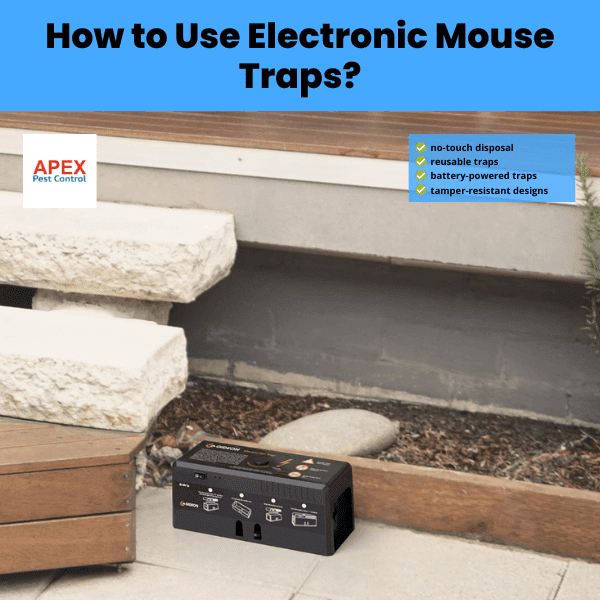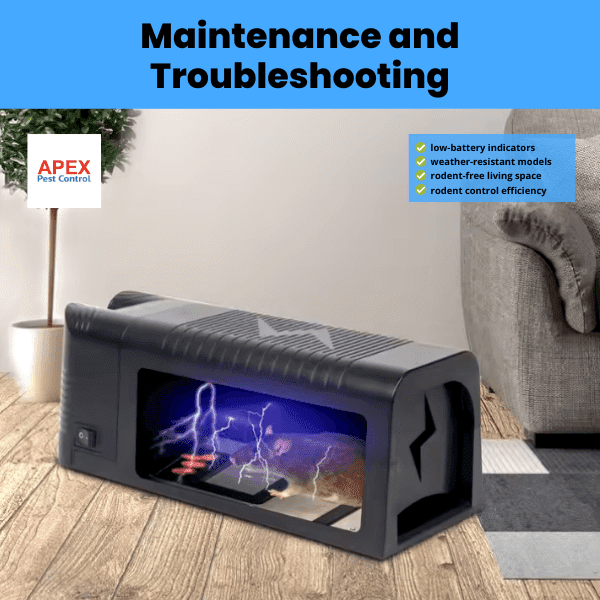The Basics of Electronic Mouse Traps A Comprehensive Guide
Are you tired of dealing with pesky rodents in your home? Electronic mouse traps might be the solution you’re looking for. Let’s explore these innovative devices and how they can help you achieve a rodent-free living space.
If you require a professional pest control company visit Apex mouse control services for proven methods to maintain a rodent-free space at home or in the workplace.
Understanding Electronic Mouse Traps

Electronic mouse traps are advanced rodent control devices that use high-voltage electricity to quickly and humanely eliminate mice. These traps are designed with sophisticated circuitry that detects a mouse’s presence when it enters the trap, completing an electrical circuit and delivering a fatal shock.
How They Work
Once baited, electronic mouse traps lure rodents into their tunnel-like design. As the mouse steps on metal plates inside, it completes an electrical circuit, releasing enough power to cause instant electrocution. Many models feature indicators to alert you when a catch has been made.
Types of Electronic Mouse Traps
There are two main types of electronic mouse traps:
- Single-use traps: Designed for one-time use and disposal
- Multi-use traps: Can accommodate multiple catches before requiring cleaning or battery replacement
Benefits of Using Electronic Mouse Traps

Efficiency and Effectiveness
Electronic traps provide quick elimination without causing unnecessary suffering. With proper placement and baiting, these devices can be highly efficient in controlling rodent populations in both homes and businesses.
Safety Aspects
Unlike traditional snap traps or poison baits, electronic traps pose no risk of accidental injury from triggered mechanisms or exposure to toxic substances.
Environmental Impact
These devices do not use chemicals, contributing less pollution compared to other control methods like poisons, which might have adverse environmental effects.
Comparing Mouse Trap Types: Electronic vs Glue Boards vs Snap Traps

| Trap Type | Avg. Cost (£) | Reusable | Humane Kill | Safety | Effectiveness |
|---|---|---|---|---|---|
| Electronic | £30-£80 | Yes | High | High | 90-100% |
| Snap | £1-£5 | Sometimes | Moderate | Low | 60-70% |
| Live Catch | £10-£30 | Yes | N/A | High | 70-80% |
Electronic Mouse Traps
Pros:
- Humane and quick killing method
- No-touch disposal of dead mice
- Reusable and cost-effective in the long run
- Safe around children and pets when used properly
- Can catch multiple mice before needing to be reset
Cons:
- Higher initial cost (£30-£80)
- Require batteries or electrical power
- May not work well in damp environments
- Some models can be bulky
Glue Boards
Glue Trap Regulations in the UK
England: Glue Traps and the Law
In England, the public cannot use glue traps to catch rodents, as this is now illegal under the Glue Traps (Offences) Act 2022. This law started on 31 July 2024. However, professional pest controllers can apply for a special licence to use glue traps in rare cases. These cases must involve a serious risk to public health or safety, like in hospitals or food factories, where no other method works well enough.
Licensing for Professionals in England
Natural England is in charge of giving out glue trap licences to pest controllers. To get a licence, you must show you’ve done the right training, such as the RSPH Level 2 Award in Pest Management and a course like the “Killgerm Principles in the Use of Rodent Glue Traps Under Licence (2024 version).” You also need to prove why glue traps are needed and that other options won’t work. Licences are only given when there’s no better way to solve the problem.
Wales: A Full Ban on Glue Traps
In Wales, glue traps are completely banned for everyone, including pest professionals. This rule began on 17 October 2023 under the Agriculture (Wales) Act 2023. There are no exceptions or licences allowed, making Wales the first UK nation to stop all use of glue traps.
Scotland: New Ban in Place
Scotland has also banned glue traps for everyone. The Wildlife Management and Muirburn (Scotland) Act 2024 was passed on 21 March 2024 and became law on 30 April 2024. The ban started fully on 1 August 2024. Like Wales, there are no licences or exceptions for pest controllers.
What This Means for Pest Professionals
If you work in pest control, you need to know these rules. In England, you can apply for a licence from Natural England if glue traps are your only option, but you must follow strict steps. In Wales and Scotland, glue traps are off-limits completely. Staying up to date with these laws helps you work legally and keeps your business running smoothly. For more details, contact Natural England or check your local regulations.
Snap Traps
Pros:
- Very affordable (£1-£5 per trap)
- Quick killing method when properly set
- Reusable in many cases
- No batteries required
Cons:
- Can be dangerous for pets and children
- Requires careful handling to avoid injury
- May cause mess if not checked regularly
- Only catches one mouse at a time
- Some mice may learn to avoid them
How to Use Electronic Mouse Traps

Placement Tips
For optimal results, place your device along walls where mice often travel. Corners or hidden areas behind furniture or appliances are excellent locations.
Baiting Techniques
Good bait choices include peanut butter or chocolate spread; the scent will lure them inside. Avoid using cheese as most rodents prefer sweet or high-protein baits.
Safety Precautions
Always switch off or remove batteries before cleaning the unit to avoid accidental shocks. Keep away from children and pets due to the electrical component.
Maintenance and Troubleshooting

Cleaning Procedures
To clean your trap after a kill, disable power then remove the dead rodent by shaking it loose into a bag for disposal. Wipe down the interior with warm soapy water then dry thoroughly before reusing.
Common Issues and Solutions
The most common issue is lack of captures, which can be remedied by changing bait type or location until you find what works best in attracting your specific mouse population.
Lifespan and Replacement
Quality electronic traps can last several years with proper care and maintenance. Always have spare batteries handy, as depleted ones affect performance.
Frequently Asked Questions
How effective are electronic mouse traps compared to traditional snap traps?
Electronic mouse traps have been shown to be highly effective, with some models boasting a 100% kill rate in controlled studies. A 2022 survey by the National Pest Management Association found that 78% of pest control professionals recommend electronic traps for residential use due to their efficiency and humane killing methods.
Are electronic mouse traps safe to use around children and pets?
Most electronic mouse traps are designed with safety features to prevent accidental harm to children and pets. These include tamper-resistant designs, enclosed bait compartments, and automatic shut-off mechanisms. However, it’s crucial to follow manufacturer guidelines and place traps in areas inaccessible to non-target animals.
How long do batteries typically last in an electronic mouse trap?
Battery life varies depending on the model and frequency of use. On average, a set of high-quality AA batteries can power an electronic mouse trap for 30-50 kills or up to 3 months of continuous operation. Some advanced models feature low-battery indicators to ensure optimal performance.
Can electronic mouse traps be used outdoors?
While most electronic mouse traps are designed for indoor use, some weather-resistant models are suitable for outdoor placement in protected areas like garages or sheds. However, exposure to moisture and extreme temperatures can affect performance and longevity.
How do electronic mouse traps compare in cost to other rodent control methods?
Initially, electronic mouse traps have a higher upfront cost compared to traditional traps, ranging from £20 to £100 for quality models. However, their reusability and efficiency can make them more cost-effective in the long run, especially for persistent infestations.
Remember, when dealing with persistent or severe rodent problems, it’s always wise to consult with professional pest control services. They can provide tailored solutions and ensure the most effective and safe approach to rodent control in your specific situation.

Tony Johnson, Founder & Lead Technician at Apex Pest Control, is a BPCA and NPTA accredited pest management expert with over 35 years’ hands-on experience. Tony specialises in Integrated Pest Management and ensures all services comply with UK pest legislation, including the Wildlife and Countryside Act 1981 and COSHH Regulations 2002. His commitment to continual learning and adapting to industry best practices means clients receive effective, safe solutions for pests affecting homes and businesses across South Yorkshire. Tony’s dedication to professional standards, ethical treatment methods, and local expertise has made him a trusted partner for pest control and prevention.
-
BPCA & NPTA accredited | CHAS certified
-
Committed to UK pest law compliance & safety
-
Focused on effective, ethical pest management for South Yorkshire


